Believe it or not, this is near the top of the list of topics I am most passionate about when it comes to health! I cannot begin to tell you how many times I have had conversations about stomach acid with friends, family members, patients… pretty much anyone who will listen. And now I want to educate you on this extremely important and misunderstood topic. If you are someone who has dealt with heartburn/reflux/GERD, you probably have some feelings about stomach acid that aren’t super positive. But I am hoping to change that today. The truth is, stomach acid is not the enemy; in fact, it is a great ally for your health! I learned this the hard way.
Most people assume heartburn is caused by too much stomach acid, when in fact it is usually caused by too little…and/or it being in the wrong place!
There is a little muscular valve between the esophagus and the stomach called the lower esophageal sphincter (LES), which opens when we swallow food to allow it to pass into the stomach and is then supposed to stay closed to keep the acid in the stomach to start breaking down the food. But for various reasons, the LES can open when it is not supposed to, allowing stomach acid to go up into the esophagus causing heartburn. One thing that can cause this is low stomach acid, because adequate stomach acid helps signal the LES to close, so if there isn’t enough there, it doesn’t get the message. Some other things that can cause this valve to not close properly include: aging, nicotine, caffeine, alcohol, high-fat foods, orange juice, tomatoes, spicy foods, hiatal hernia, eating & drinking too much in one sitting, and some medications. In the images below you can see where the LES is located. Stomach acid is not meant to be in the esophagus. It does not have the same level of protection as the stomach lining, which is why it is so uncomfortable acid is there.
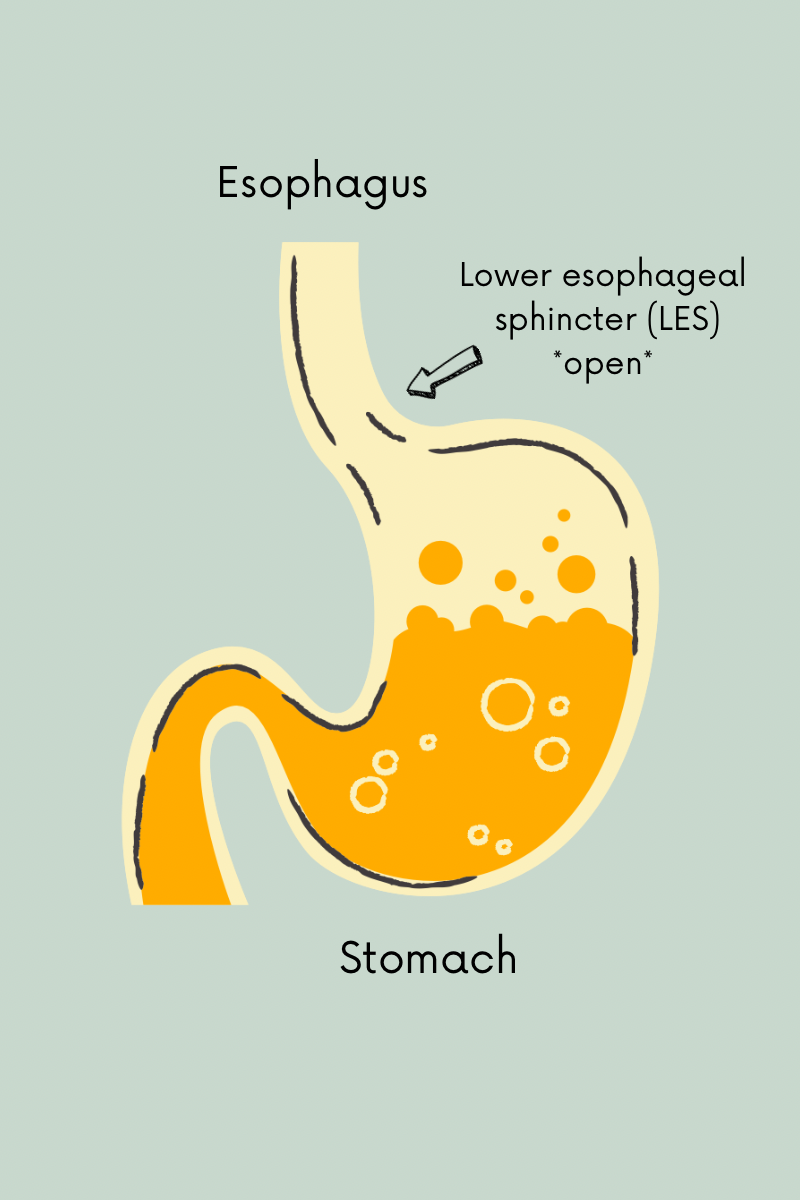
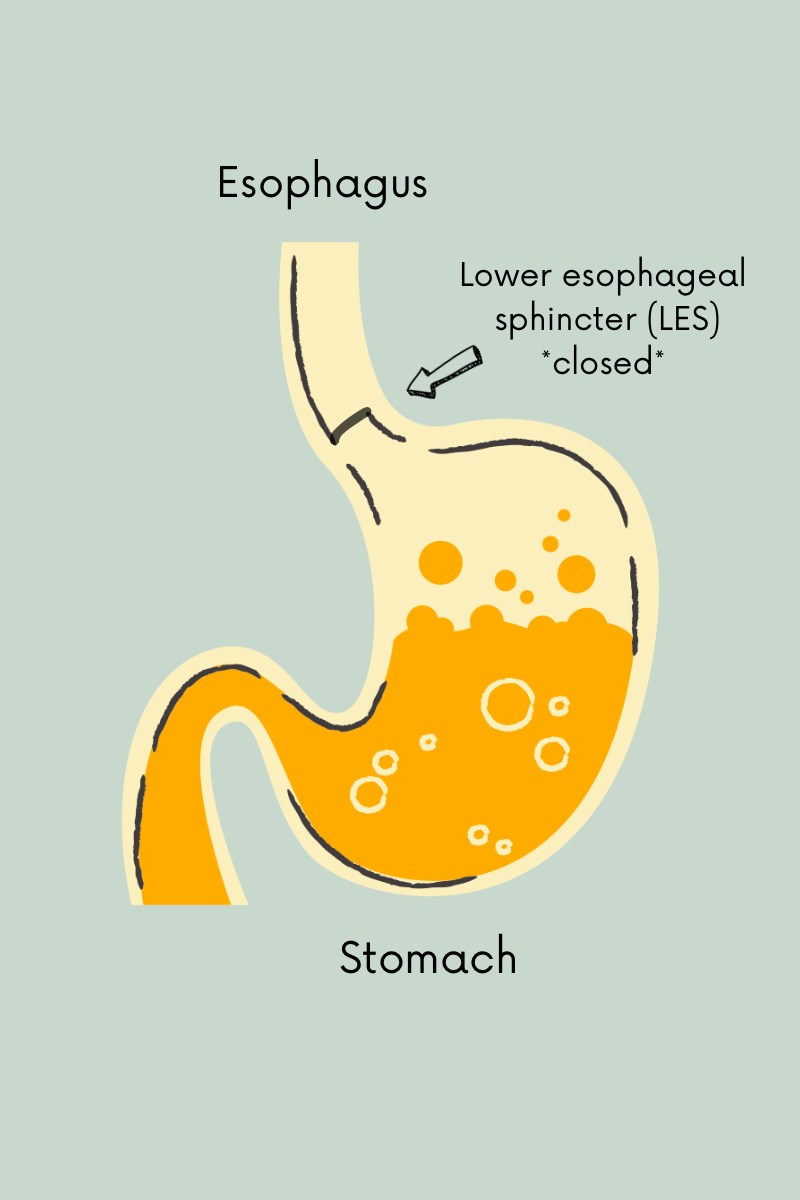
Too little stomach acid is called hypochlorhydria. Many things can decrease stomach acid levels. Some common ones are stress, food sensitivities, acid-blocking medications, flouride, aging, thyroid issues, gastric bypass surgery, nicotine, alcohol, zinc deficiency, vitamin b deficiency, and inflammation of the stomach lining (gastritis).
Why is it so important that we have enough acid in our stomach and that it stays there? We need proper stomach acid to begin digesting our food so that the rest of the system can do it’s job well. If we don’t have enough, we are probably not absorbing vitamins and nutrients from our food and supplements very effectively. Stomach acid is also our first line of defense against infections like H. pylori, food poisoning, fungal & bacterial overgrowth, and parasites. This is an invaluable part of your body’s immune system! Seventy percent of the immune system is in the gut, and stomach acid has an important role to play.
The image below is from one of my textbooks for the Functional Nursing Program I am in right now. The book is called “Digestive Wellness” by Dr. Elizabeth Lipinski. Check out the lists showing symptoms of low stomach acid and diseases associated with it!
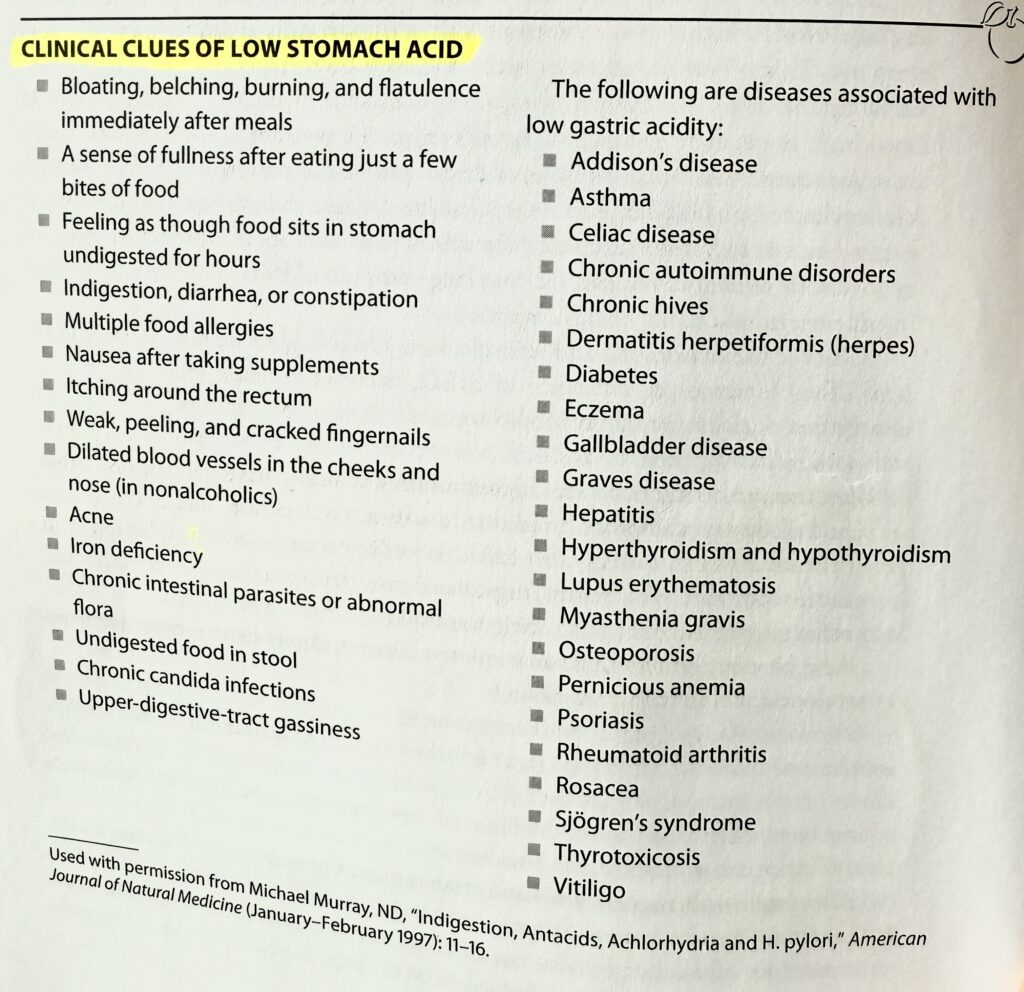
Obviously, many of these symptoms and conditions can be caused by other things, too. Fortunately, there are a couple of inexpensive and easy ways to evaluate your stomach acid status at home! They are not to be done if you are on an acid-blocking medication, though.
Baking soda test
- First thing in the morning before eating or drinking anything, mix 1/4 tsp baking soda in 4 ounces of water and drink.
- Time how long it takes for you to burp or belch. If it takes at least 3 minutes, that is a sign of insufficient stomach acid.
- Repeat 3 mornings in a row to minimize variables that can cause false positives or negatives
Betaine HCl test
The main component of stomach acid is called hydrochloric acid or “HCl.”
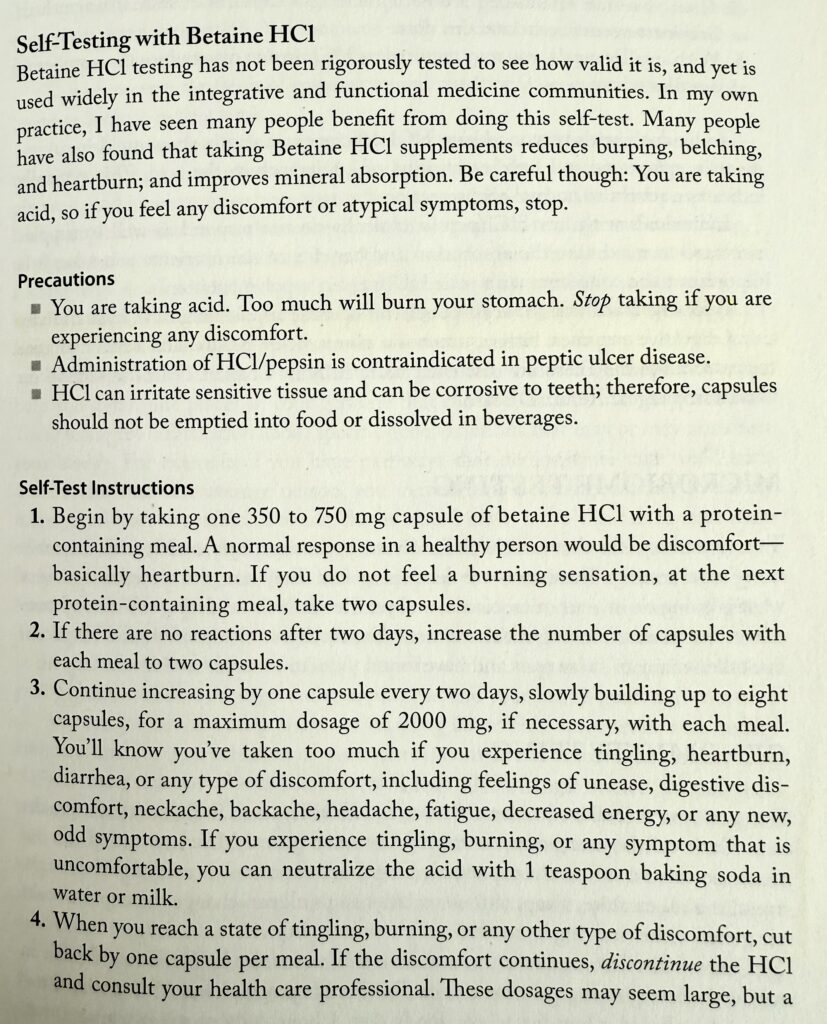
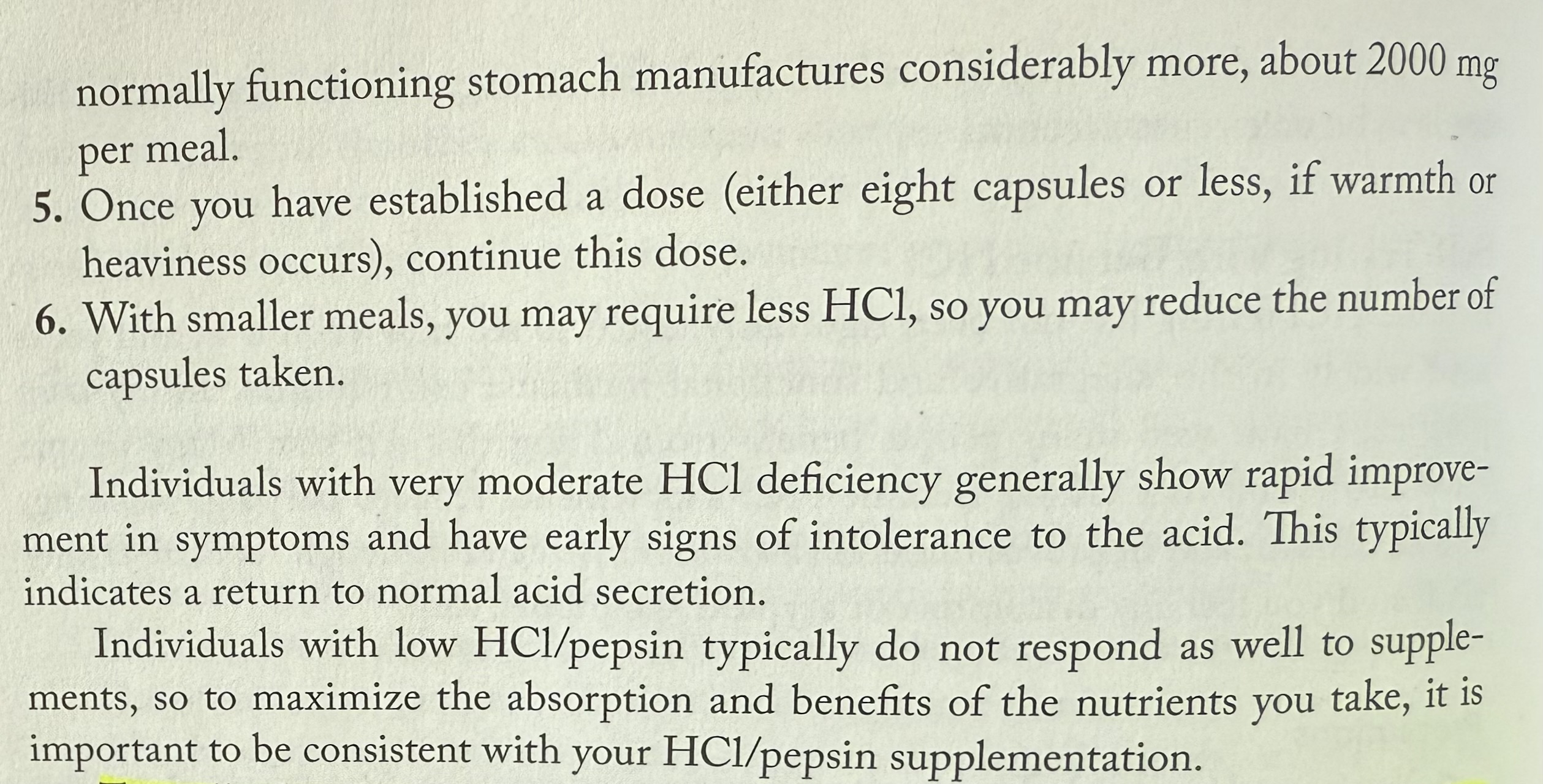
In most cases, you should be able to wean off of HCl supplementation over time after your levels return to normal. And then you can just take it as needed for when you eat or drink trigger foods, are in a high stress period, etc. Besides HCl, other things that can help are digestive bitters, eating smaller meals, drinking less with your meals and chewing your food more thoroughly. It is usually recommended to chew each bite around 30 times. You may be surprised to find you’ve been doing much less!
Have you heard the term, “rest and digest?” If you have read my vagus nerve blog, you may remember reading that this refers to the parasympathetic side of the nervous system that promotes a relaxed state. The entire digestive system works better if you are calm when you eat! One thing I have been working on is taking a few deep breaths when I sit down, before I start eating. It is also good to slow down if you are a fast eater. You may be eating faster than your digestive system can keep up with. The G.I. tract starts in the mouth. One purpose of saliva is to begin to break down the food as you chew and act as a catalyst to activate the parietal cells to make stomach acid, but most of us chew, swallow and eat so fast. Adequate chewing can really make a huge difference! It also takes about 20 minutes for your brain to tell your body you are full. Really try to be present during your meal: turn off the t.v., savor the flavors of the food and enjoy conversing with anyone you may be sharing a meal with. This is such an important part of life!
Acid-blocking medications known as proton pump inhibitors (like Prilosec, Prevacid and Nexium) are one of the most commonly prescribed classes of drugs in the U.S. They greatly reduce the acid production in your stomach, which hopefully you understand now, is not usually a good thing! Even if you have too much acid, it is better to get to the root to see why that is and resolve it, rather than just inhibiting the system indefinitely. Acid-blocking drugs are meant to be used short-term for stomach ulcers, but many people are left on them long-term and they can have some serious side effects like dementia, kidney disease, and osteoporosis. If you are on one of these medications, I encourage you to consider talking to your doctor and weighing the risks and benefits. I’m sure there are cases where this may be the most appropriate treatment option for a short time. But I’m also certain they are very overprescribed! If you do decide to taper off, make sure you do it very slowly.
If you deal with heartburn symptoms, I feel your pain! I had terrible heartburn and bloating for years. I used to pop Tums like nobody’s business and literally carried them with me in my purse wherever I went. I was on a PPI medication for quite a while, until I learned about the potentially dangerous effects of taking them long-term; unfortunately, my doctor was not the one to educate me on this. It did greatly help my symptoms and give me relief… but I also wonder if any of the health issues I’ve dealt with since might be linked to greatly decreasing my stomach acid for a time? No way to know for sure, but I am thankful I got to the root and learned WHY my heartburn was happening and how to treat it is a more natural, healing way that supports my body, rather than suppress it. These are some of my favorite products that I have found beneficial. You can click here to see their links on my “favorite things.” page.
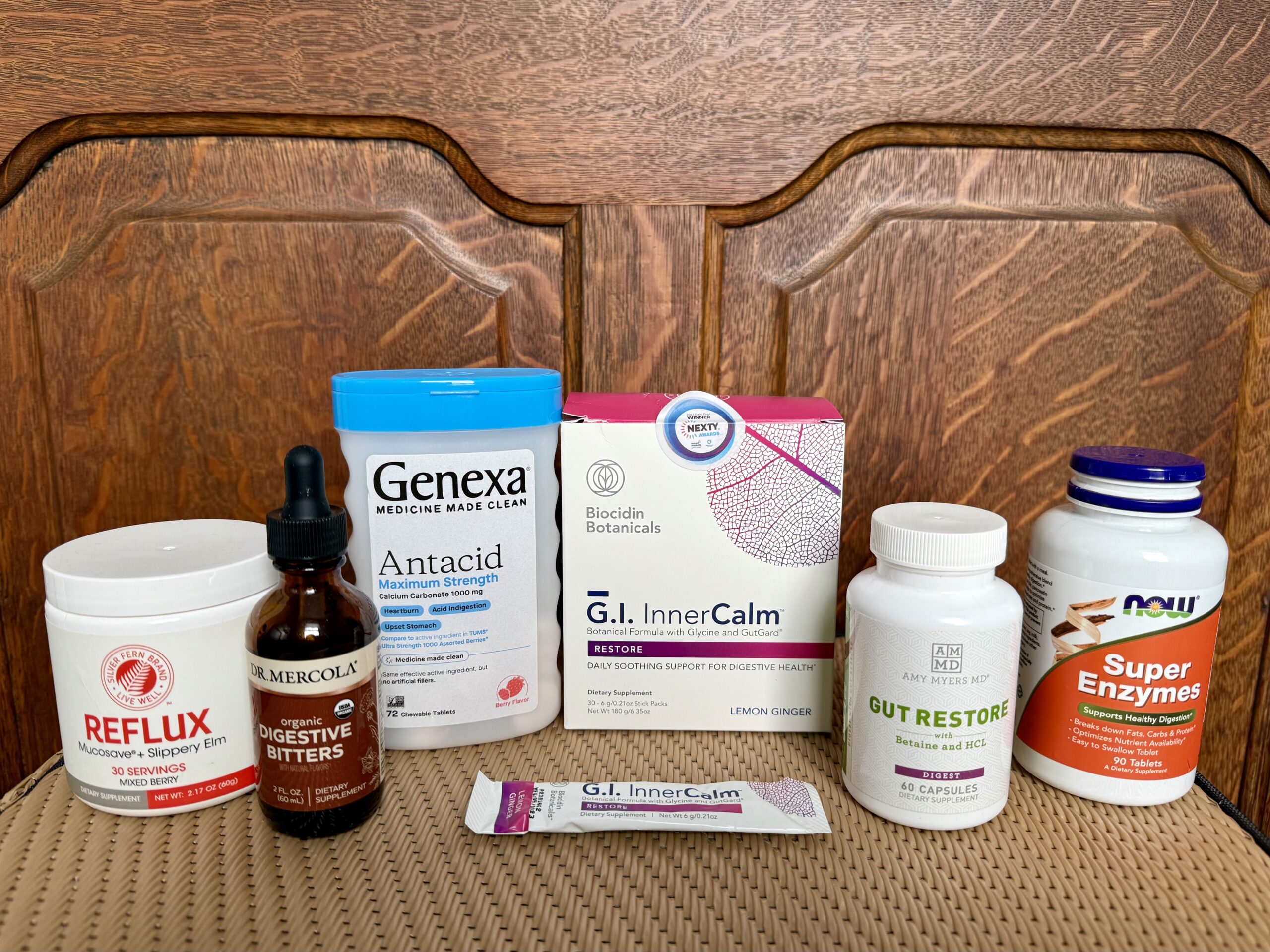
Our bodies are wonderfully made (I’m convinced more every day) and there is so much we can do to support them functioning the way they were meant to! If yours is trying to get your attention with a symptom like heartburn to let you know something is off… don’t just slap a bandaid on without considering the consequences or asking why. Slow down, pay attention, be gentle and reach out to a functional medicine practitioner if you need help. That is what we are here for! In a lecture for a functional medicine course I took years ago, I loved how this presenter ended his talk on gut dysfunction:
“We don’t treat disease, we treat people and their unique relationship to the world. To a large extent, functional medicine is independent of the diagnosis.” Dr. Tom O’Bryan

Although I am a nurse by trade, I am not a doctor or an expert, and the information I provide on this blog is for educational purposes only. Each person is unique and their needs and circumstances vary, so I always recommend that you consult your medical provider before making any changes.


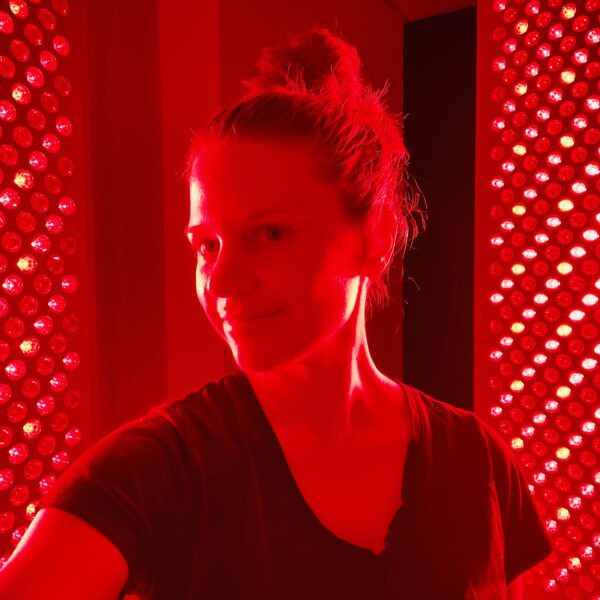
Very informative article! Learning lots from you!
That really blesses me to know! Thanks, Steph! I came across a sweet note from you the other day from my high school graduation 🙂 Grateful for you and Tim and the role you played in my life during that season!
Hi Chelsey! Great blog and such good information. Thank you! I’m going to take the baking soda test when I get home. We’re down at Rosemary beach right now. Be home March 4.
I hope your class is going well for you. Seems like you’re learning a lot.
Miss our visits. Tell Cory hello.
Love, Elizabeth
Hello! I am glad you enjoyed it and found it helpful! Let me know how the test goes 🙂 I hope you’re having a wonderful time at the beach! I’m loving the class, learning some great things and also getting a lot of great reminders! Excited to start my own business this summer. God is good! I miss you, too!